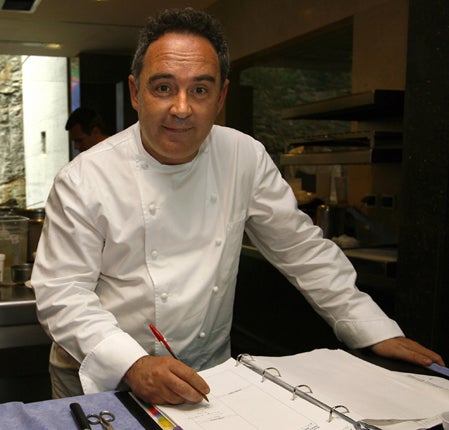'Best chef in the world' to teach at Harvard
Ferran Adria of Spain's El Bulli restaurant to tutor on 'culinary physics'

Cooking is usually considered an art, but this autumn it formally becomes a science. For 13 weeks starting in September, Ferran Adria, often hailed as the world's greatest chef, will be in residence at Harvard University, one of the world's great seats of learning, to teach a course in a brand-new discipline called culinary physics.
At first glance, the news is as much of a bombshell as Mr Adria's announcement last month that he will close his celebrated restaurant El Bulli in Catalonia, which is regularly booked out months in advance and is widely regarded as the finest place to eat on the face of the planet. But perhaps it should not be a surprise.
"All cooking, if you look at it, is soft-matter physics," Otger Campas, a Harvard research fellow and a native of Barcelona who is helping organise the course, told The Washington Post. "This is designed to create a dialogue between cooks and scientists."
Mr Adria, who is 47, has always been an artist who has treated his kitchen as a laboratory. As a pioneer of what is now known as the "deconstructivist" culinary style, his technique is to take the ingredients of a familiar dish, but cook them separately in unfamiliar ways. The end product is thus both similar, but utterly different.
As the great man put it in one of his books, El Bulli 1994-1997, it amounts to "taking a dish that is well known and transforming all its ingredients, or part of them; then modifying the dish's texture, form and/or its temperature. Deconstructed, such a dish will preserve its essence... but its appearance will be radically different from the original's."
These dazzling variations on well-known themes, usually executed with groundbreaking techniques, have earned him admiration bordering on adulation from peers such as Paul Bocuse and Joël Robuchon – not to mention the accolade of Best Chef in the World from Restaurant magazine no fewer than five times.
This wizardry will now be on display at Harvard, where Mr Adria will join forces on the course with Jose Andres, the most lionised of the new generation of chefs in Washington, DC who are turning the capital of the free world into one of America's most interesting restaurant towns as well.
Both Mr Adria and Mr Andres have taught at Harvard before, in December 2008, when the master from Catalonia explored a "caviar" of melon granules and a "pasta" made of ham. On that occasion, he signed an agreement to collaborate on gastronomic science with Harvard's School of Engineering and Applied Sciences.
Both disciplines gain from the deal. The chefs will harness new cutting-edge technologies to their art. As for the physicists, the very existence of the course is proof that the esoteric knowledge in which they specialise has real-life uses as well. Furthermore, they'll have something to eat after the class. And when they get tired of deconstructed cuisine, there's always the local burger bar.
Join our commenting forum
Join thought-provoking conversations, follow other Independent readers and see their replies
Comments
Bookmark popover
Removed from bookmarks